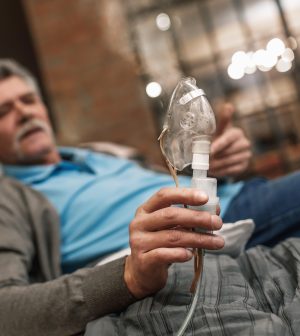- Could Your Grocery Store Meat Be Causing Recurring UTIs?
- Are You Making This Expensive Thermostat Error This Winter?
- Recognizing the Signs of Hypothyroidism
- 10 Strategies to Overcome Insomnia
- Could Artificial Sweeteners Be Aging the Brain Faster?
- Techniques for Soothing Your Nervous System
- Does the Water in Your House Smell Funny? Here’s Why
- Can a Daily Dose of Apple Cider Vinegar Actually Aid Weight Loss?
- 6 Health Beverages That Can Actually Spike Your Blood Sugar
- Treatment Options for Social Anxiety Disorder
CPAP Helps Cut Heart Risks — But You Have to Actually Use It

For sufferers of sleep apnea, continuous positive airway pressure (CPAP) machines may guard against having a second heart attack, stroke or other cardiovascular crisis, but they have to use it consistently, a new study finds.
CPAP works by keeping your airways open during sleep, but because it requires wearing a mask, many people find it uncomfortable so they don’t keep it on the amount of time needed to protect against heart problems. CPAP needs to be used at least four hours a night, and preferably six hours, to effectively prevent second strokes or heart attacks, experts say.
“This is the first analysis that, based on existing trials, demonstrates that the use of CPAP is associated with a 31% reduction in the risk of having a second heart attack or stroke,” said lead researcher Dr. Ferran Barbe. He is chair of respiratory medicine at the Hospital Universitari Arnau de Vilanova de Lleida of the University of Lleida in Catalonia, Spain.
Still, “treatment compliance is a key factor in secondary cardiovascular prevention in patients with sleep apnea,” he said.
For the study, Barbe and his colleagues examined the outcomes of nearly 4,200 patients included in 24 previously published studies. All the patients had sleep apnea, suffered a cardiovascular event and were using CPAP.
The investigators found that patients who used CPAP for four or more hours a night were less likely to suffer a second heart attack or stroke than those who used the device less often.
The report was published Oct. 3 in the Journal of the American Medical Association.
“Sleep apnea is associated with an increased risk of cardiovascular illnesses and cerebrovascular illnesses, namely high blood pressure, atrial fibrillation, heart attacks and strokes,” said Dr. Harly Greenberg, medical director of Northwell Health Sleep Disorders Center in New Hyde Park, N.Y.
A number of studies done in Europe, particularly in France, have shown a positive effect of CPAP preventing death and future occurrence of cardiovascular events, Greenberg said, “but you have to use the therapy for at least four hours, preferably six hours, a night to get an impact.”
Meanwhile, a number of studies have found that CPAP didn’t make a difference in preventing second heart attacks and strokes, he added.
These researchers, however, reevaluated these studies and found that adherence to treatment was key. When they looked at only those patients who used CPAP at least four hours a night, they saw CPAP’s benefit, Greenberg explained.
“If patients are going to use therapy to try to reduce their risk of another heart attack and other stroke or cardiac arrhythmia, they certainly have to use it for the entirety of the night,” he noted. “If they do, at least according to this study, they’re going to get a significant decrease in that risk. Other studies have shown the sweet point is six hours a night.”
Whether CPAP will prevent a first heart attack or stroke isn’t proven yet, he said, but CPAP’s effect on lowering blood pressure has been shown.
CPAP is notoriously uncomfortable and it’s hard to adjust the device to make it comfortable to use all night, and that’s is why many patients don’t use CPAP long enough to get its benefits, Greenberg said.
“You have to work with your doctor to find better ways to adhere to therapy, to find better motivation and to get the mask to fit more comfortably,” he advised.
For patients who can’t tolerate CPAP, alternatives are available, but those have not yet been proven to have the same benefits as CPAP in preventing heart attacks and strokes, Greenberg said.
“There are oral appliances that advance the jaw and open the airway that’s been shown to have some impact on blood pressure, but not long-term cardiovascular risk,” he noted.
Surgical therapies for the upper airway are available that may also have an effect, Greenberg said.
“More recently there is the hypoglossal nerve [which controls muscles that move the tongue] stimulator therapy, a bio-electronic therapy to improve patency [openess] of the airway by stimulating the nerves that innervate the base of the tongue,” he said. “But again, long-term cardiovascular outcomes data for that therapy is not there yet.”
More information
For more on sleep apnea, head to the Sleep Foundation.
SOURCES: Ferran Barbe, MD, chair, respiratory medicine, Hospital Universitari Arnau de Vilanova de Lleida, University of Lleida, Catalonia, Spain; Harly Greenberg, MD, medical director, Northwell Health Sleep Disorders Center, New Hyde Park, N.Y.; Journal of the American Medical Association, Oct. 3, 2023
Source: HealthDay
Copyright © 2026 HealthDay. All rights reserved.










